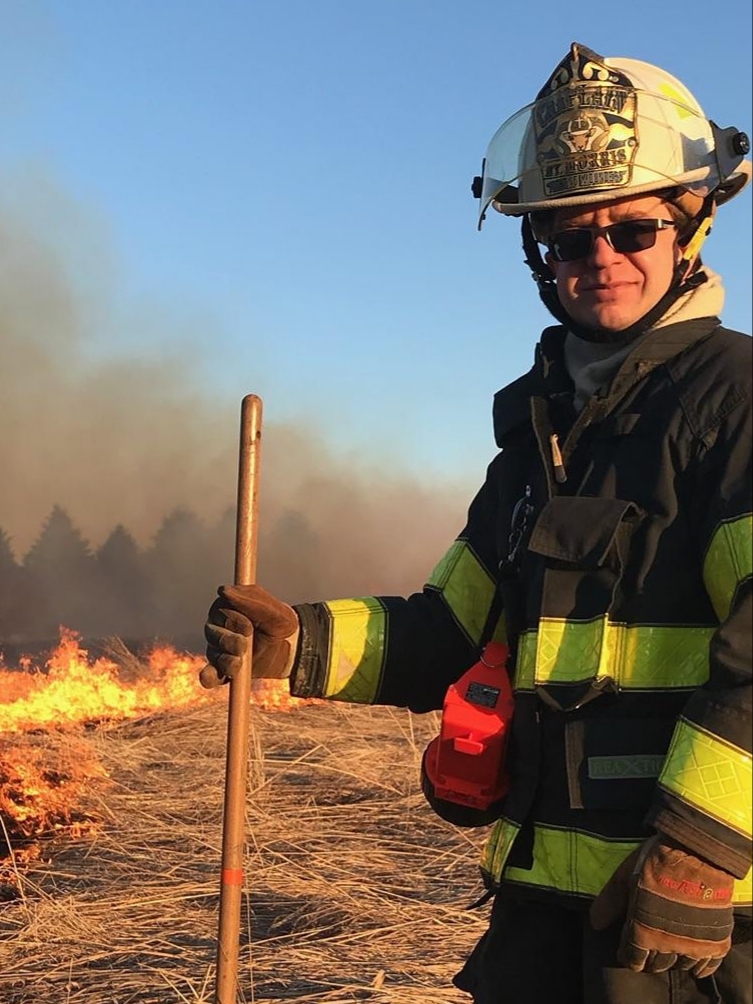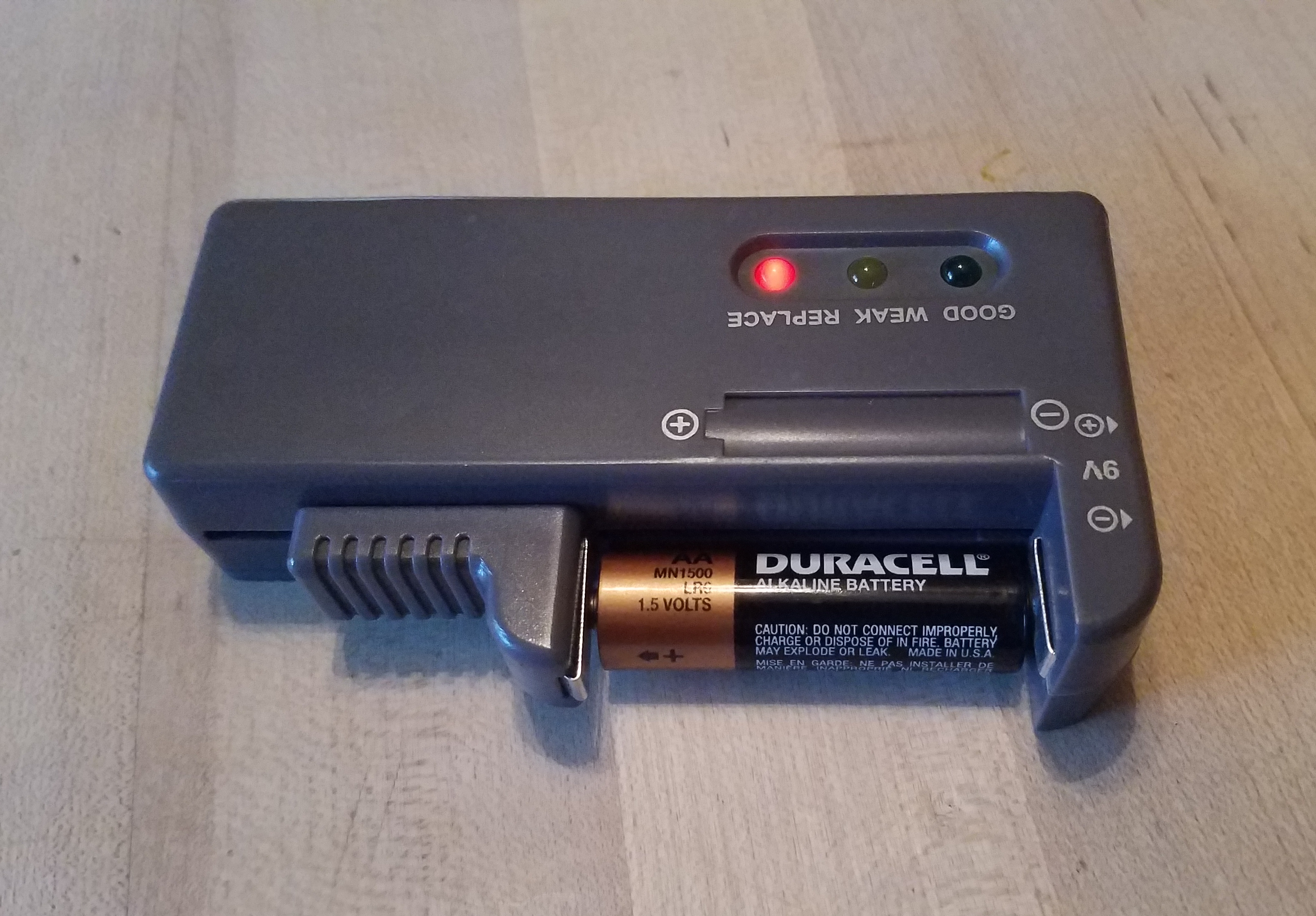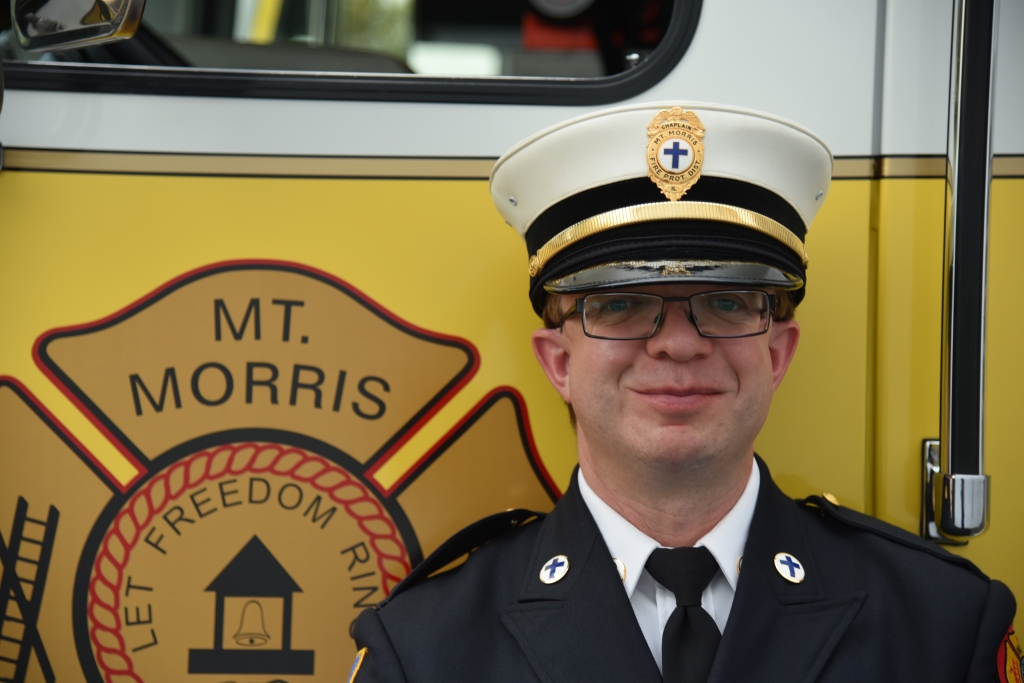From the Chaplain’s Rack: Carrying LODDs

This reflection first appeared January 2022 in the Illinois Firefighters Association newsletter, The Bulletin.
140 Line of Duty Deaths in 2021.
5 LODDs in Illinois.
For 2021, I decided to track each LODD on a map in my office. The USFA and Firefighter Close Calls notifications have always been a lightly chaotic experience for me, coming in trickles and downpours with names appearing and going from my mind. It seemed too simple to read the notice, delete the post, and continue on.
I wanted to hold space and time for each of these names. I’m never going to remember all of them, or the nature of their death, and that is not the goal. For me, it is the simple acknowledgement that these women and men signed on, threw on their gear, grabbed their EMS bags, and responded to someone else’s distress.
For me, and maybe for you, each of these ribbons and every email, represents a person no different from the ones I am privileged to serve alongside. Some have spouses and kids, some are flying solo. Some of these individuals accumulated decades of experience, others were brand new. Some were full time paid, others were paid on call or unpaid volunteers. They all showed up, the way our people show up.
We cannot know all their stories, even as we know that each one lived remarkably. We have all spent our time seeing the notification that grabs our attention and then falling down a rabbit hole of research and facebook pages and local news clips. We go looking for answers and information, clues in obituaries and initial reports, that remind us of the humanity of each LODD victim, and how their experiences compare to ours. We want to know whatever we can, in order to make something as senseless as death make just a little more sense.
We want these 140 people to matter, and they do. The way our companies, officers, families, this vital work of caring for our community, matters. One of the biggest challenges we face in the fire service is a feeling of futility. Firefighters and EMS personnel are doers, fixers, responders, type A’s who always have a plan with a backup plan and a few more plans mapped out just in case. When our plans fall apart, when our best efforts are still not enough, when we are reminded of the limitations of our humanity, it can be deflating.
Honor the fallen by giving them a passing thought when the email comes. Honor these people by training and learning from NIOSH reports. Honor them by taking care of yourself.
If one of these names cuts a little too close, talk to your faith leader or fire chaplain. Seek out peer support or professional care. Don’t let those obnoxious thoughts, the ones that can slowly creep in through LODD stories, become too loud. We don’t get to choose which incidents will affect us, yet we can choose to name our thoughts before they consume us.
The work will always be there, as will be the risks. As I am submitting this for print, 9 LODDs have appeared in my inbox. 9 new ribbons for 2022. 9 more reasons for us to be diligent with our skills, our situational awareness, and our health. Take care of yourself, take care of your company, watch out for each other.
Safe Call Now (24-7 crisis hotline for first responders) 206-459-3020
National Suicide Prevention Hotline 800-273-8255
Crisis Text Line (National Suicide Prevention) “Hello” to 741741
Firefighter Behavioral Health Alliance Self-Assessment (mental health survey)
Employee Assistance Program-EAP (does your department have one?)
Fire Department Chaplain or Peer Support Personnel
From the Chaplain’s Rack: How is Your Spirit
I am the fire chaplain for Mt Morris Fire Protection District in Illinois and Fire Chaplain for the Illinois Firefighters Association. This reflection first appeared July 2021 in the Illinois Firefighters Association newsletter, The Bulletin.
How is your spirit doing these days?
As an aside, whenever I hear the word “spirit,” I think of high school basketball games where the fans yell, “We’ve got spirit, yes we do! We’ve got spirit, how bout you?” Not exactly what I was meaning.
The words spirit and spirituality have an air of religion to them, which can create a reflex to want to ignore them. I get it. I’m a full-time religion person, an ordained Lutheran Christian minister in the ELCA, and I tend to recoil from churchy words, too.
If you’re still with me, I want to invite us to think about spirituality in broader terms. You may be a deeply religious person, on the fence about the God stuff, or an absolute atheist. You can be Christian, Muslim, Jewish, Hindu, Wiccan or have a uniquely local group with which you share your life. To talk about our spirituality is to talk about how we see ourselves in relation to others.
Spirituality is the core of who we are and the connections that sustain us. Spirituality is our wholeness and how we are made whole by the people who are in our lives. And when we have strong relationships and are feeling whole, we have a resilient protective force at work in lives. We have hope.
Spirituality is about liturgies and studies for those who use them in their faith practices, and it is as much about how we look forward with anticipation and a sense of purpose. In an Army Public Health Center post from July 2020, spirituality is described as “unique to each individual, and refers to the deepest part of you. It is the innermost part of you that allows you to gain strength and hope.”
Our spirit, or spirituality, is our inner resolve. To put it in better terms, it’s how we put up with the stuff of life, including the stuff we deal with in the fire service. We are called out of our bunks and meals and routines to respond to someone else’s crisis, and we always respond with our best training, skill, and focus. Most of the time, we’ll do our jobs and keep moving. Sometimes those calls stick with us. Or they pile up. They linger in our thoughts and begin to weigh on our hearts. The military calls these heavy events moral injuries. They are the situations and acts that do not line up with our understandings of justice, safety, and right and wrong.
We in the fire service have a powerful sense of right and wrong. It is why we respond to the tones in the middle of the night or at the end of shift. It is why we care so deeply for those strangers and neighbors we will show up to serve whenever they need us. It is why the calls that go sideways, or were tragic before we showed up, can linger on our hearts and challenge our purpose. Maybe even alter our ideas of who we are in relation to others.
How is your spirit these days, friends? How is your internal sense of balance and resolve? Who are your people when the calls pile up? How are you maintaining hope? I want to invite you, as you put focus on your tactical training, to put some time into your spirit. Your inner resolve is vital, and your sense of self is necessary. Because you are necessary.
Take care of yourself, take care of your company, watch out for each other.
Safe Call Now (24-7 crisis hotline for first responders) 206-459-3020
National Suicide Prevention Hotline 800-273-8255
Crisis Text Line (National Suicide Prevention) “Hello” to 741741
Firefighter Behavioral Health Alliance Self-Assessment (mental health survey)
Employee Assistance Program-EAP (does your department have one?)
Fire Department Chaplain or Peer Support Personnel (I hope you have one in your ranks)
From the Chaplain’s Rack: Recognizing the Impact of Trauma

To my firefighting and emergency medical responding siblings, we need to talk about how to acknowledge that this pandemic might be messing with us. I’ll start with myself.
I was sitting at my computer in mid-April when I suddenly realized that I had been staring blankly for half an hour. I wasn’t watching anything, typing anything or thinking about anything at all. 30 minutes were gone and for a breath, I panicked.
I realized in that moment that I was empty. I had nothing left and my brain had shut down. The panic came from acknowledging that this disruption was utterly beyond my control. The wiring in my head turned off without me and here I was, nearly catatonic until I woke up.
For many of us, this pandemic has been more than an obnoxious inconvenience. It has been upsetting, disorienting, frustrating, and terrifying. These responses place it into the category of traumatic event. I thought as first responders, it might be helpful for us to recognize its potential impact on our lives.
What is a traumatic event? As defined by the National Institute of Mental Health, it is “a shocking, scary, or dangerous experience that can affect someone emotionally and physically.”
Not feeling shocked, scared, or fearful? You may not, that’s fine. What if I asked your spouse? Your partner? Your kids? What about your boss? They might agree with you, and they might not.
Here’s something worth knowing about traumatic events: you don’t get to choose what will be traumatic for you. And you don’t get to decide how trauma will affect you. That sucks for many of us to hear because women and men in the fire service are classic type A people who like to have a handle on whatever we’re doing. We love a good plan, as well as several backup options.
This one, unfortunately, isn’t in your control. Our brains are funny like that, they are influenced by everything around us. With that in mind, what you can do is choose to accept that it very well could happen, or be happening to you, and name it and figure out how to live with it.
The symptoms of suffering trauma run the spectrum from perpetual anger to virtual paralysis, from irrational tears to bouts of inappropriate laughter. It can mean impulsive behaviors, like snapping at your dog, drinking or smoking more than usual for you, or sudden needs to be highly active.
ITS ALL NORMAL.
None of these symptoms are weakness. They are not proof that you can’t cut it in the real world. More people are going through these symptoms than we might dare to realize.
ITS NORMAL. It’s okay to not be okay.
Let me be clear. It’s not okay to be destructive or to damage property. Its not okay to holler at your spouse or your family. Its not okay to start using or abusing or self-medicating. These are dangerous behaviors and if you find yourself moved toward any of these, call for help. It is better to pick up a phone, put down our pride, and use the resources available to find our balance again.
What do you do if your battery runs out?
First, a couple things I will NOT tell you do:
You do NOT need to remain positive. Positivity is annoying. Worse, it denies us the human ability to have any emotions other than happy ones. If you’re not in a good mood, that’s where you are at. You can still be respectful, but you don’t need to smile.
You do NOT need to get over it. It’s a classic American ideal that is great for hopping fences or crossing a bridge. Traumatic events are wiring issues buried deep in the brain with breathing and eating and the heart pumping. It is why, when people have panic attacks, their hearts race, their breathing quickens and they might even burst into tears or pass out. They are not willingly reacting these ways, its automatic and beyond their control. You can’t quick fix yourself, so don’t fight yourself.
What you can do (start with just one):
Breathe. That’s it. Keep breathing and realize that this autonomic system is reliable and good.
Be okay with yourself. You have to be okay with yourself, especially if you are not okay. If you are finding yourself irritable, exhausted in the middle of the day, or doing any other odd-for-you things, fess up to yourself. Then fess up to your spouse, partner, or close friend. Name it, start there.
Share it with someone. Do not carry this on your own. You might be good for a while, but you will wear out without recognition and care. I remember so little from my EMT training in the 90’s, but I remember this, “A dead EMT saves no one.” You need to give this to someone else. Find someone.
Work on your resilience. Cornell University defines resilience as “an individual’s ability to positively cope with stress and adversity – bouncing back to a previous state of normal functioning, or using the experience of adversity to enhance flexibility and overall functioning.” Who doesn’t want more of that? Resilience is our turnout gear, it takes practice, and we’ll discuss it in detail later.
Below is a list of resources. All of them are confidential, safe, and available. There’s nothing wrong with you if you pick up the phone, and you no one needs to know. I can’t say it enough: they’re confidential.
You signed on to one of the best volunteer opportunities available. EMS and fire fighting are incredible ways to serve our neighbors. It weaves us into epic histories and cutting edge technology and training. While we are busy caring for others, though, we must take care of ourselves. So, take care of yourself, keep your batteries charged, recognize any changes that have happened in your daily behaviors, and keep track of each other. It is for your safety and for your company’s.
Safe Call Now (24-7 crisis hotline for first responders) 206-459-3020
National Suicide Prevention Hotline 800-273-8255
Crisis Text Line (National Suicide Prevention) “Hello” to 741741
Firefighter Behavioral Health Alliance Self-Assessment (mental health survey)
Employee Assistance Program-EAP (does your department have one?)
Fire Department Chaplain (I hope you have one in your ranks)

